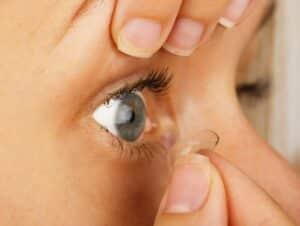CLOW: Contact Lens Over Wear

One of the key questions the optometrists at Cannon EyeCare try to ask all contact lens wearers is: what is your contact lens wearing schedule? In other words, do you wear them all day every day, or do you take one day off/week, or maybe you remove them two minutes before bed, or perhaps you even sleep in your contacts? Avoiding Contact Lens Over Wear (CLOW) can make you much less likely to have complications like infections.
We take the time to inquire about your current habits in contacts because Contact Lens Over-Wear (CLOW) is one of the riskiest things you can do in your contacts. Many patients sleep in their lenses, which is known in the industry as Extended Wear. Aside from sharing used contacts with a friend or cleaning them in your mouth (which are both extremely risky) sleeping in contacts is probably the most dangerous thing you can do to your eyes as a contact lens wearer. We strongly discourage sleeping in contacts because we don’t want to see our patients to come in with a painful infected red eye. We know you don’t want that either.
If you think about it, we did not evolve with contacts in the eyes. So the cornea on the front of the eye needs a lot of oxygen to stay healthy. If you wear your lenses all waking moments, there is never really a time when your corneas get 100% oxygen. They are not getting much oxygen when you are asleep, as the lids block all access to the air. This scenario compromises your eye health and sets you up for corneal ulcers, bacterial conjunctivitis, or an inflammatory condition such as GPC: Giant Papillary Conjunctivitis or CLARE: Contact Lens Associated Red Eye. All of these conditions hurt and are potentially vision threatening.
In a perfect world, all of our patients would remove their contacts 2-3 hours before bed and wear glasses (or no glasses if you have a light prescription) the last few hours of the day. All contact lens patients should have an up to date pair of glasses; every set of eyes needs a back-up plan. If your glasses are too blurry or uncomfortable to drive safely, you should get them updated. A good way to remember to take your contact lenses out in the evening is to do it when you are changing out of your work clothes. Dr. Mark at Cannon EyeCare in Seattle asks for at least two hours a day when his patients are awake and do not have contacts in. Dr. Miranda Cannon goes one step further and asks all of her patients to wear contacts no more than 6 days a week….and take breaks every evening.
Think about your eyes. You’ve only got two to last you from birth to the grave, so take good care of them!
Sincerely, Dr. Mark Cannon, optometrist @ Cannon EyeCare (at Market Optical) in Seattle, Washington

One of the key questions the optometrists at Cannon EyeCare try to ask all contact lens wearers is: what is your contact lens wearing schedule? In other words, do you wear them all day every day, or do you take one day off/week, or maybe you remove them two minutes before bed, or perhaps you even sleep in your contacts? Avoiding Contact Lens Over Wear (CLOW) can make you much less likely to have complications like infections.
We take the time to inquire about your current habits in contacts because Contact Lens Over-Wear (CLOW) is one of the riskiest things you can do in your contacts. Many patients sleep in their lenses, which is known in the industry as Extended Wear. Aside from sharing used contacts with a friend or cleaning them in your mouth (which are both extremely risky) sleeping in contacts is probably the most dangerous thing you can do to your eyes as a contact lens wearer. We strongly discourage sleeping in contacts because we don’t want to see our patients to come in with a painful infected red eye. We know you don’t want that either.
If you think about it, we did not evolve with contacts in the eyes. So the cornea on the front of the eye needs a lot of oxygen to stay healthy. If you wear your lenses all waking moments, there is never really a time when your corneas get 100% oxygen. They are not getting much oxygen when you are asleep, as the lids block all access to the air. This scenario compromises your eye health and sets you up for corneal ulcers, bacterial conjunctivitis, or an inflammatory condition such as GPC: Giant Papillary Conjunctivitis or CLARE: Contact Lens Associated Red Eye. All of these conditions hurt and are potentially vision threatening.
In a perfect world, all of our patients would remove their contacts 2-3 hours before bed and wear glasses (or no glasses if you have a light prescription) the last few hours of the day. All contact lens patients should have an up to date pair of glasses; every set of eyes needs a back-up plan. If your glasses are too blurry or uncomfortable to drive safely, you should get them updated. A good way to remember to take your contact lenses out in the evening is to do it when you are changing out of your work clothes. Dr. Mark at Cannon EyeCare in Seattle asks for at least two hours a day when his patients are awake and do not have contacts in. Dr. Miranda Cannon goes one step further and asks all of her patients to wear contacts no more than 6 days a week….and take breaks every evening.
Think about your eyes. You’ve only got two to last you from birth to the grave, so take good care of them!
Sincerely, Dr. Mark Cannon, optometrist @ Cannon EyeCare (at Market Optical) in Seattle, Washington
Pike Place Office
1906 Pike Pl Unit 8-b,
Seattle, WA 98101
University Village Office
2602 NE University Village St,
Seattle, WA 98105
Pike Place Office Hours
Monday
Closed
Tuesday
10:00 am - 5:00 pm
Wednesday
Closed
Thursday
10:00 am - 5:00 pm
Friday
10:00 am - 5:00 pm
Saturday
10:00 am - 5:00 pm
Sunday
Closed
University Village Office Hours
Monday
10:00 am - 6:00 pm
Tuesday
10:00 am - 6:00 pm
Wednesday
10:00 am - 6:00 pm
Thursday
10:00 am - 6:00 pm
Friday
10:00 am - 6:00 pm
Saturday
10:00 am - 6:00 pm
Sunday
Closed
